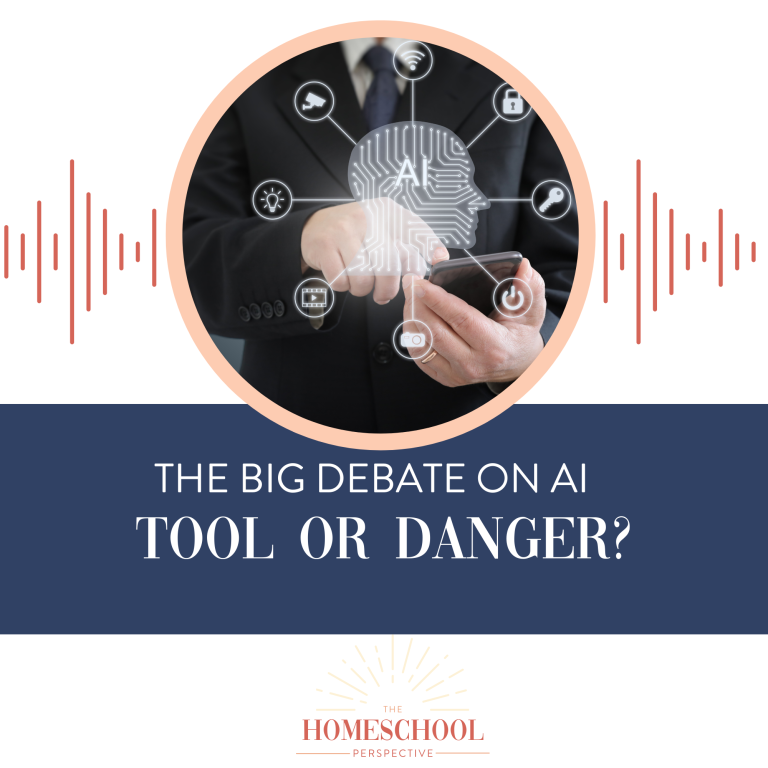AI & Homeschooling: Part 2
The Rise of AI in Homeschooling: Innovation or a Dangerous Shortcut?
Artificial Intelligence (AI) is no longer confined to the realms of science fiction. It’s woven into our everyday lives, from our cars and home assistants to search engines and even homeschool curriculum. But as AI becomes more sophisticated, homeschool families face a pressing question: Is AI a powerful tool to enhance learning, or is it an easy shortcut that could weaken essential thinking skills?
In a world where AI tutors are now being marketed as a replacement for human instruction, the conversation around education is shifting. Some public schools are turning to AI as a solution to teacher shortages, with students spending the majority of their days on screens. While technology has its advantages, what happens when human interaction in learning is minimized? And more importantly, how does this affect our homeschoolers?
AI as a Tool—Not a Teacher
AI is already playing a role in homeschooling, whether we realize it or not. Tools like Grammarly, Khan Academy, and even Google Search utilize AI to assist in learning. Many parents use AI to help with homeschool organization—scheduling lessons, outlining curriculum ideas, or generating grocery lists to streamline meal planning and free up mental energy.
But when AI moves beyond being an assistant and starts teaching in place of real human interaction, we have to pause. The rise of AI tutors—lifelike but completely artificial faces offering instruction in everything from foreign languages to math—raises concerns about the loss of real-world connection and critical thinking development. If kids learn everything through programmed responses rather than live discussions, how will they develop essential soft skills like communication, problem-solving, and adaptability?
The Danger of Over-Reliance on AI
One of the most significant risks of AI in education is the loss of struggle. Learning is supposed to challenge kids. Working through a difficult math problem, rewriting an essay, or conducting a hands-on science experiment builds resilience. But when AI provides instant answers, kids may miss out on these critical learning experiences.
Homeschool parents are no strangers to balancing efficiency with quality education. With so much on their plates, it’s tempting to use AI-powered programs that promise self-paced, hands-free learning. But at what cost? If a child never has to wrestle with a concept or take the long way to an answer, they may struggle with perseverance later in life.
“Earn your dopamine” is a phrase that resonated deeply in this discussion. In an age of instant gratification, we need to make sure our children are still experiencing the joy of mastering a skill through effort, rather than the fleeting satisfaction of an AI-generated shortcut.
AI in Homeschooling: A Balanced Approach
So how can homeschool families use AI without falling into its potential pitfalls? The key is intentionality. AI should be an editing tool, not a starting point—a way to refine and enhance learning, but not replace foundational skills.
Here are a few practical ways to use AI responsibly in homeschooling:
✅ For Parents
- Organizing lesson plans and brainstorming curriculum ideas
- Formatting schedules and structuring unit studies
- Using AI to check for passive voice or grammar errors in writing
🚫 Not for Kids (Until They’ve Mastered the Basics)
- Writing essays or answering comprehension questions for them
- Skipping over foundational math skills (like long division) by using AI-based calculators too soon
- Replacing real-world interaction with AI tutors instead of engaging with parents or peers
Homeschooling has always been about customization, creativity, and connection—all things that AI, no matter how advanced, cannot replicate. As technology evolves, homeschool families must stay in the driver’s seat and ensure that AI serves as a tool for learning rather than a replacement for true education.
What’s Next?
AI isn’t going anywhere. If anything, it will continue to integrate deeper into education. The question isn’t whether to use it, but how to use it wisely. We as homeschool parents have the opportunity to teach our kids discernment—not just how to use AI, but when to use it, and when to rely on their own skills.
What do you think? Are you using AI in your homeschool? Are you wary of it? Let’s continue the conversation.






